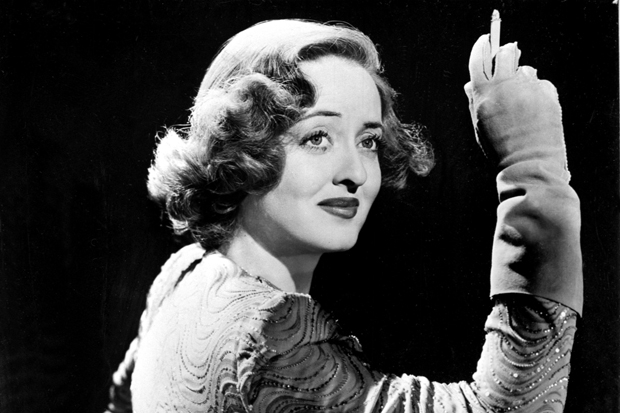It was called Frankly Speaking and by golly it was. The great screen actress Bette Davis was being interviewed by not one but two men: George Coulouris, with whom she co-starred in Hollywood, and a BBC producer. ‘It’s a little sad for some of us who adore your work that a lot of your best performances have been in fairly trivial films,’ said the producer, Peter Duval-Smith, as if to tempt Davis into dishing the dirt on the directors who made her what she became. ‘I don’t know what you’re talking about,’ Davis replied, not a woman to be tricked into anything.
‘Who do you think made you a star?’ Duval-Smith persisted.
‘Me myself,’ said Davis. ‘And my sweat, blood and tears…’
‘Nobody helped you?’
‘Beyond that, there were the fabulous public relations people. They presented us to the public.’
Davis had a point. The Hollywood studios invented PR in the 1930s, taking over their stars and remodelling them for public consumption. But it was daring of her to ignore the directors, producers, money men behind all those films. Nothing was going to get in the way of her achievement, or her passion for motion pictures. ‘I loathe theatre,’ she said. ‘I loathe the life.’ Adding, as if we hadn’t already understood her point, ‘I loathe sitting around all day and wanting to work all night.’
There’s something about this interview (first broadcast on the old Home Service in 1963 and aired again on Radio 4 Extra on Tuesday) that’s so raw, so bristling with energy and life. It was startling, and absolutely gripping. Davis, who died in 1989, refused to be drawn on her private life (those four marriages) or that infamously venomous relationship with Joan Crawford, her co-star in Whatever Happened to Baby Jane? But you don’t feel cheated by her unwillingness to confide. On the contrary, she withholds and at the same times bares all. On no account could she ever have been swaddled by her agent, so confident was she of her star quality.
The effect is arresting. It’s hard to convey on the page the menace contained in her cackling ‘don’t-mess-with-me!’ laugh, or the way she intimidated both men. You can hear her thumping her hands on the table and Duval-Smith and Coulouris whimpering their agreement.
‘If you hadn’t been in it, I don’t think we’d remember Dark Victory,’ Duval-Smith daringly suggested.
‘I beg your pardon… I beg your pardon.’
Two large intakes of breath as Duval-Smith and Coulouris struggle to find something else to talk about. You could almost feel the tension.
It was like a blast of fresh air, and especially so during these days and weeks of election fever when the airwaves are stuffed full of platitudes and motormouths speaking in tongues. Over on the World Service the two winning plays in last year’s international playwriting competition (run by the BBC and the British Council in association with the Open University) are now ready for broadcast, crackling through the ether because of their passion, energy and refreshing take on what makes a drama. On Saturday we heard The Cactus Flowers by the Zimbabwean writer Virginia Jekanyika, writing in English as her second language (and directed by Marion Nancarrow).
‘I wrote this play,’ Jekanyika tells us at the start, ‘because I wanted to talk about the hardships faced by women in Africa.’ She was also working through her grief at the recent death of her mother. But she doesn’t write about mothers and daughters; instead she pays tribute to her mother’s life by writing about the everyday struggles of Ndaka and Magi who work as cleaners in a wildlife resort in Zimbabwe. As they wash clothes, sweep rooms, worry about their husbands and the threat of HIV, we hear about their dreams of another, easier, more fulfilling life. They are the cactus flowers, blooming ‘among the thorns of life’.
The drama takes a while to get going, and at first the characters are not clearly defined enough for the listener to work out who is speaking. But then Ndaka and Magi, and their boss, Karen, fearful that she might have to give up the resort and go back to England, gradually emerge as real people through the plainly written but very believable dialogue, so that we begin to care what happens to them. ‘Do I have the right to ask these questions?’ asks Ndaka. ‘I’m just a woman.’
The Ravens, too, by Alana Valentine (broadcast in a fortnight on the World Service and directed by Rosalynd Ward) also focuses on women’s rights, or rather their lack of them, even in supposedly enlightened Australia. Valentine bluntly exposes the red-light district of Sydney as Kira tries to get clean and leave the sex industry and the brutal tyranny of her abusive boyfriend. This isn’t, though, just a play about Kira and others like her, but about anyone who feels trapped in a life they don’t want to lead. How do you find the strength to get out, to stand up to someone who you feel you can’t stand up to?






Comments